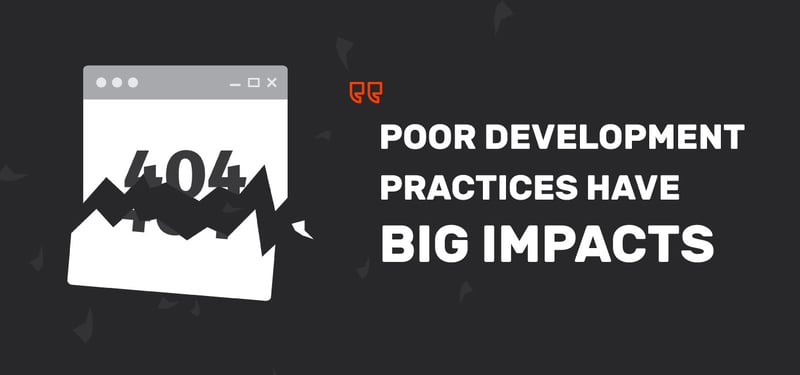Introduction
If you own or manage a Drupal site, chances are you have faced problems with it sometime or the other—slow web applications, website security issues, etc. All of these go on to hamper your customers’ experience and your business success.
It's possible that you did not make the decisions that led to your website being in the shape that it is today. All the same, you are tasked with repairing and rectifying these issues.
Website issues that recur can be a huge drain on your resources. If you have an experienced team of Drupal developers on hand to catch and fix these issues, they may not pose a huge problem for you. But in the absence of effective support, you may find yourself struggling to meet your website goals as more and more of your attention is diverted towards troubleshooting and reacting to security incidents.
Often, the bigger challenge is that there may be things wrong with your website that are not visible to anyone who does not have experience with building and maintaining websites. These issues only become visible when something goes seriously wrong.
What’s affecting my Drupal site?
Here are some issues you may be seeing repeatedly on your Drupal site if you don’t have an effective support and maintenance team looking after it.
- Slow page load
- White screen of death
- Security issues
Often, such issues are symptoms of deeper problems, like memory exhaustion. Some of them may be pointing to backwards compliance issues that you’ve inherited over time, while others may be issues that are building up and impacting your site performance even now.
How do you know what’s stopping your website from performing well? Let’s take a look at the different types of issues and what you can do about them.
Legacy code & unsupported modules make Drupal sites vulnerable.
Retrospective issues are caused by things having gone wrong in the past. This can be in the form of old legacy core code, problems with contrib modules, or issues with custom modules.
Legacy core code can slow down performance and introduce vulnerabilities into your Drupal site, leaving it open to attack. Also, beyond a point, older versions are longer be supported by the Drupal community, meaning that you no longer get access to security patches, bug fixes and valuable community support.
Newer versions of Drupal give developers access to all the latest features, automation and an easier development process. They also offer a host of other benefits, such as improved caching that helps speed up performance, a mobile-first approach, and SEO-friendliness.
Contrib modules are those that have been contributed by members of the Drupal community. Not all modules are equally well supported. Some may be abandoned after a new version or module is introduced, and site maintainers may have to struggle to find a replacement module to upgrade to.
With more developers now creating powerful modules that offer a range of functionality, single-purpose modules often get abandoned, or made obsolete. These new modules also introduce a learning curve, the length of which depends upon the skill level of the Drupal developer tasked with updating the module after a failure.
However, custom code, created especially for your website by a developer or team of developers, is what most issues can be traced back to.
Finding skilled Drupal site builders can be a challenge, and often businesses end up working with people who do not have the experience or skill level to do a great job. They may end up getting the job done in the short-term, but as your site ages, the long-term consequences of these poor decisions start to pop up in the form of security issues or performance failures.
A support provider who is focused on responding effectively to the business’s need can address these issues by conducting an audit at the start of the engagement. During this process, retrospective issues can be identified, backlogged and prioritized, and your support team can work through them along the way.

Besides issues that may have been introduced into your Drupal site due to poor practices in the past, there is a range of issues that can also come up due to poor development and maintenance practices. These are issues that may be affecting your Drupal site under maintenance, if your vendor or in-house website support team isn’t following best practices.
Poor development practices and engineering pain points such as a lack of standardization can wreak havoc with your website’s architecture. Other poor practices include merging code branches without a careful code review, poor configuration management, inadequate record keeping around which modules were added when, not maintaining a style guide, using PHP code inside nodes, blocks or views, etc.
A less experienced Drupal site builder may also work without following any kind of site building checklist, doing everything on an ad hoc or last minute basis. This means that everything is dependent on that person’s experience of having dealt with such issues before. Often, there is no central process being followed, no automation, and testing is ad hoc or manual, so critical tasks get overlooked.
Experienced site engineers understand the value of documentation and organization. The right set of tools, best practices and SLA adherence, along with critically examining all issues that do pop up on the website, go a long way in preventing recurring issues with your Drupal website.
Central to all this is customer empathy.
Customer success attitude could be the biggest reason why your site isn’t performing. A vendor who is simply looking at short-term gains would be satisfied with getting the job done with minimum effort and no consideration for issues that may come up in the future.
On the other hand, a vendor with a customer success focus would be interested in helping you achieve the business outcomes you desire. They will help you choose the best solution for your business (which sometimes may not even be the best for them).
This also reflects on the need for Drupal support agencies to be staffed by skilled team members. Vendors who want to deliver the best to their customers would also invest in their team and give them opportunities to grow their skills through training and certifications.
What should you do now?
Website performance issues have a huge cost. Repeated downtime impacts your customers’ experience and their expectations of you. But all this can be fixed in one go—by ensuring that you have a support team that takes code health, standardization and documentation seriously.
If you have a website that’s not performing well, you have several choices before you, with varying cost implications.
You can ignore these issues and risk your business, or you can try to proactively address them. Even if you go ahead with trying to have a Drupal support team or engineer address issues on your website, there are various approaches you can take.
You can have them implement a quick patch to fix any immediate issues—but this does not necessarily prevent these issues from cropping up again. To ensure long-term success for your Drupal site, you’d have to drill down deeper into the root cause of the issue, and find a way to rectify that. Needless to say, this costs time and money.
In some cases, making sure all major issues are resolved once and for all may mean doing an overhaul of the entire website—likely to be an expensive option, but one that would have a bigger payoff in terms of value.
So, the choice is yours, and one that you should make taking into consideration how critical your Drupal site is to your day-to-day operations as well as for providing you with new avenues for growth.

Nathan Roach, Director of Marketing
Germany-based consumer of old world wine and the written word. Offline you can find him spending time with his wife and daughter at festivities in the Rhineland.

 We respect your privacy. Your information is safe.
We respect your privacy. Your information is safe.




Leave us a comment